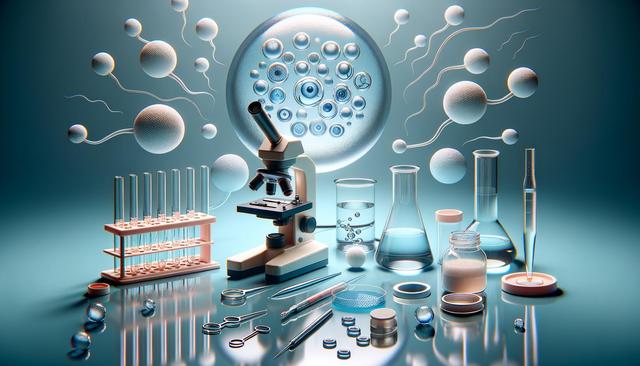What Is Sperm Donation?
Sperm donation is a process in which a man voluntarily provides his sperm to help someone else conceive a child. This process is typically conducted through a licensed fertility clinic or sperm bank, ensuring medical safety and legal clarity. While the concept may appear simple, it involves multiple steps, including screening, consent, and storage. Donors are often anonymous, although some recipients may opt for known donors depending on the legal frameworks and clinic policies in their region. The donated sperm can be used for intrauterine insemination (IUI) or in vitro fertilization (IVF), depending on the medical needs of the recipient.
Donors must meet specific age and health criteria to qualify. Typically, they are required to be between 18 and 39 years old and in good overall health. Before acceptance, they undergo a comprehensive screening process to evaluate genetic history, infectious diseases, and lifestyle factors. This careful approach helps ensure the safety and health of any potential offspring.
Who Uses Donor Sperm and Why?
Sperm donation is utilized by a diverse range of people. Single women, same-sex female couples, and heterosexual couples with male infertility issues are among the most common recipients. The reasons for choosing donor sperm vary and can include:
- Medical conditions affecting sperm production or quality
- Lack of a male partner
- Genetic concerns that may be passed on by the male partner
In some cases, couples may use sperm donation after unsuccessful rounds of fertility treatments using the male partner’s sperm. For many, donor sperm offers an opportunity to build a family when other options are limited. The decision to use donor sperm is personal and often follows extensive consideration and counseling.
Support from fertility clinics and mental health professionals can help individuals navigate the emotional aspects of using donor sperm. This support is crucial, especially for those concerned about the implications for the child’s identity or future questions regarding biological parentage.
The Donation Process: Step by Step
The process of becoming a sperm donor involves several stages to ensure safety, legality, and effectiveness. Here’s a general overview of how it works:
- Initial Application: Prospective donors fill out detailed questionnaires about their health, lifestyle, and family medical history.
- Medical and Genetic Screening: Blood and urine tests are conducted to check for infectious diseases and genetic conditions.
- Psychological Evaluation: Donors may undergo a psychological assessment to confirm they fully understand the implications of donation.
- Sperm Collection: Once approved, the donor provides sperm samples, usually through masturbation at the clinic.
- Quarantine and Retesting: Samples are frozen and quarantined for several months. Donors are retested for diseases before the sperm is cleared for use.
All samples are stored in cryogenic conditions and may remain frozen for years before being used. This controlled process ensures that both the recipients and any future offspring are protected from potential health risks.
Legal and Ethical Considerations
Legal aspects surrounding sperm donation vary by country and region. In many places, donors sign agreements that waive parental rights and responsibilities. This legal framework protects both the donor and the recipient from future disputes. However, some recipients choose known donors, in which case legal contracts are especially important to clarify roles and expectations.
Ethical concerns also arise, particularly around anonymity. Some donor-conceived individuals express a desire to know their biological origins. In response, a growing number of countries have adopted open-identity donation policies, where offspring can access identifying information once they reach a certain age. While this supports transparency, it also introduces complex emotional and legal dynamics that must be carefully managed.
Fertility clinics often provide counseling services to help both donors and recipients understand these implications before proceeding. Legal advice is also strongly recommended when using known donors or when cross-border fertility treatments are involved.
Emotional Impacts and Future Considerations
Both donors and recipients may experience emotional responses to the sperm donation process. Donors sometimes reflect on the idea that they have biological children they may never meet, while recipients might feel a mix of gratitude and anxiety about raising a donor-conceived child. These feelings are natural and underscore the importance of psychological support throughout the journey.
For children conceived through donor sperm, questions about identity and origin may arise as they grow older. Parents are increasingly encouraged to be open with their children about their conception story. Studies suggest that early and age-appropriate disclosure can foster trust and emotional well-being.
Finally, advancements in genetic testing and online DNA databases have made donor anonymity more difficult to maintain. Both donors and recipients should be aware that biological connections can sometimes be discovered unintentionally, which may have implications for all parties involved.
Conclusion: A Thoughtful Path to Parenthood
Sperm donation offers a meaningful path to parenthood for many individuals and couples facing fertility challenges. While the process involves medical, ethical, and emotional considerations, proper support and information can guide those involved toward informed, thoughtful decisions. Whether you are considering donating or using donor sperm, understanding the full scope of the process is essential for making choices that align with your values and long-term goals.












